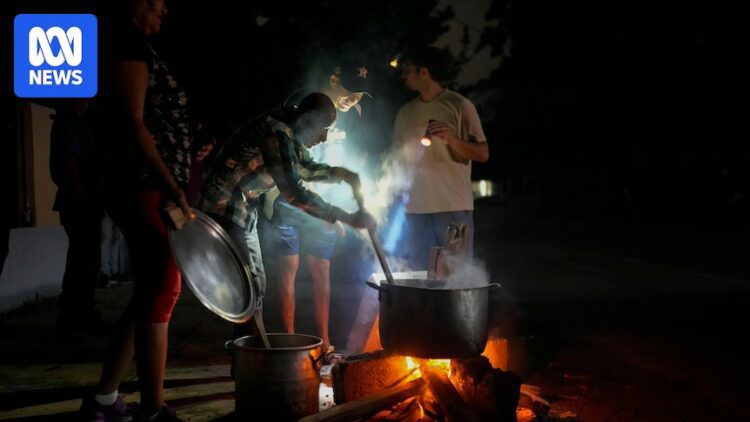Despite recent crude oil and diesel deliveries from Mexico, Cuba continues to struggle with power blackouts and a worsening economic crisis.
Fossil fuels are the main source of power on the island, and the state has long depended on Venezuela and Russia for those resources to help power the nation.
But now shipments of Russian and Venezuelan oil have largely petered out, leaving over 10 million Cubans facing more large-scale blackouts.
What is the current situation?
Mexico has come to Cuba’s aid with nearly 500,000 barrels of crude oil and diesel, oil shipment data provided to The Associated Press showed on Thursday.
“Mexico now is key because Venezuela has dropped its supplies to Cuba, Russian oil, it’s nowhere to be seen,” said Jorge Piñon, senior research fellow at the University of Texas at Austin’s Energy Center, which tracks the shipments.
“Mexico’s oil deliveries to Cuba are extremely important.”
Despite the new delivery, Cuban Minister of Energy and Mines Vicente de la O Levy said it will still be impossible to keep the lights on during peak hours.
He said that talks continue with Russia, Venezuela and Colombia on getting more help with resources.
The government has long failed to invest in alternative energies like solar power. (AP File: Ramon Espinosa)
“(They) are in constant communication with us and are asking us to tell them how they can support us,” he said.
Cuba’s national grid collapsed four times in a week in late October after the island’s largest power plant, Antonio Guiteras, failed.
And while the Mexican oil delivery has helped, many Cubans are still without power and some are lacking access to clean water.
How did Cuba get here?
At its core, this crisis can be linked to the Fidel Castro-led revolution in 1959.
In 1960, America placed an economic embargo on all exports to Cuba, with exceptions for food and medicine.
For the 62 years that have followed since the embargo, Cuba has relied heavily on the importation of crude oil for power.
Despite that, the Cuban government blames the US economic embargo for its recent woes.
President Miguel Díaz-Canel said “financial and energy persecution” has interfered with Cuba’s importation of fuel.
Cuba’s President Miguel Diaz-Canel. (Reuters: Norlys Perez)
However, Cuba’s power grid has limited its investment in alternative energies like solar power.
The share of Cuba’s electricity that comes from renewable sources like solar has increased from 3.8 per cent in 2012 to 5 per cent as of 2022.
Cuban officials have acknowledged that more widespread solar power would have helped alleviate some of the misery from the recent outages.
The chief of the nation’s electric utility, Alfredo López, said “we are thinking about” some regulations that would stimulate these solar purchases.
Cubans have dealt with frequent power outages for decades, but with oil imports drying up, could it become even more frequent?
How are Cubans dealing with this?
The lack of power saw the government shut down several institutions, including schools.
In some situations, citizens were left cooking their food on wood stoves in the streets.
Modesto Hernández, who lives in central Havana, said on Tuesday that he and others “don’t know anything about what is going on”.
“These problems need to be solved now,” he said. “We are in bad shape.”
Residents prepare a soup over an open fire during a blackout. (AP Photo: Ramon Espinosa)
Extreme weather has also impacted Cuba’s power supply, and the situation has led to street protests as residents become desperate.
“There are lines everywhere you go,” Havana resident Carlos López said. “You get to a place and there are obstacles and obstacles.”
However, the president has vowed to prosecute power outage protesters and increased police patrols in areas of Havana.
What happens next?
Approximately 412,000 barrels of crude oil from Mexico’s state-run oil company, Pemex has arrived in Cuba.
An additional 67,000 barrels of diesel should arrive next week.
Mexican President Claudia Sheinbaum said the country will continue sending oil to Cuba.
“We are going to support Cuba,” she said at her morning news briefing on October 31.
“Even if they criticise it, we are going to show solidarity.”
In terms of moving to solar power, China committed to building 92 solar farms in Cuba in March this year.
That is expected to add more than 2,000 megawatts of energy to the island, however, that trade relationship has not yet developed.
The nation’s electric utility has confirmed technicians on the island are working to install 26 solar projects in different provinces.
For now, the power is on in Cuba, but as Mr O Levy said, the current shipments are simply not enough to keep it on.
Due to the insecure state of the island’s energy infrastructure, the next nationwide blackout could come at any time.
Source link : http://www.bing.com/news/apiclick.aspx?ref=FexRss&aid=&tid=6725482e63fd45c690c4762e673590f3&url=https%3A%2F%2Fwww.abc.net.au%2Fnews%2F2024-11-02%2Fcuba-oil-blackouts-crisis%2F104549628&c=639436641013286171&mkt=en-us
Author :
Publish date : 2024-11-01 09:56:00
Copyright for syndicated content belongs to the linked Source.
